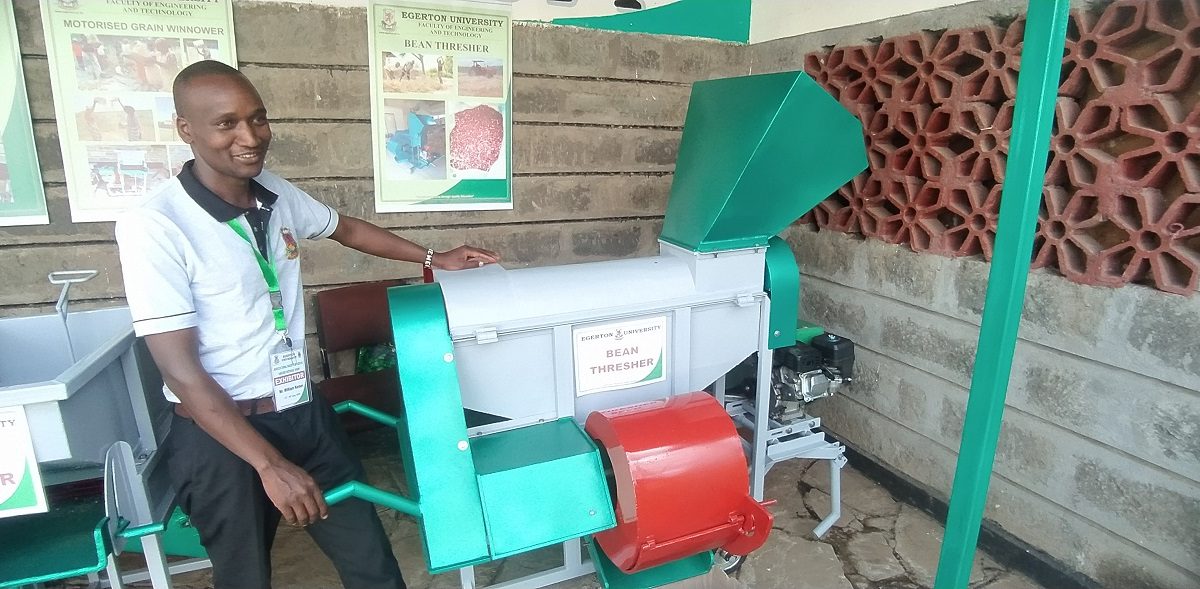Egerton University Vice Chancellor Professor Isaac Kibwage has called on the private sector to partner with universities and technical training institutes to catalyze commercialization of research and innovations through patenting of their ideas, saying the world over, sustainable development hinges on constant adaption and innovation.
Professor Kibwage said that in an era marked by rapid technological advancement and ever evolving social-economic landscape, there was need to harness the power of skills and innovation by promoting understanding of patent laws and the process of commercialization to enable Kenyans, particularly the youth, realize the full potential of their innovations.
“Any country that will be ahead in skills and innovation space will control the world,” the Don stated.
Addressing participants at a workshop aimed at fostering innovation and intellectual property awareness, Prof. Kibwage urged Kenyan innovators to patent their creations, saying by so doing, they will secure the right to exclusive use and commercial benefit of their inventions.
Professor Kibwage disclosed that the university was currently focused on commercializing a bean thresher and that the Director of Egerton University Agro-Science Park (GOK, Vision 2030 Flagship Project) Professor Paul Kimurto had been tasked with liaising with the Kenya Industrial Property Institute (KIPI) to make this a reality.
He underscored the importance of the university’s entrepreneurial initiatives, adding that they were planning to build the capacity of innovation among its staff through training programs to be conducted by the Kenya Innovation Agency (KENIA).
The Don also announced that the university’s Innovation and Commercialization Masterplan was now in place, and had been designed to offer students a strong foundation to work on their innovative ideas.
The Vice Chancellor advocated for a shift in mindset, encouraging inventors to focus on protecting their intellectual property through patents and then actively seeking commercialization opportunities.
During the workshop that was organized by the University’s Directorate of Research in partnership with the Kenya Industrial Property Institute (KIPI), Professor Kibwage urged research and educational institutions to embrace innovation as one way to boost skills development and commercialize innovations invented by their students, staff and tutors to enable them to tap their full potential in generating revenue.
He said as one of the founding members of the Council of Kenyan Entrepreneurial Universities under the Kenya National Innovation Agency (KENIA), the University was working on partnerships with East African venture capital institutions aimed at funding viable innovations to ensure full exploitation of ideas and potential.
He asked students and instructors in learning institutions to forge powerful collaborations with the business sector to translate research findings into industrial resources to create wealth and jobs.
Professor Kibwage observed that educational and research institutions carry a weighty responsibility as catalysts for socio-economic development through the creation of new knowledge, research and innovation, incubation and entrepreneurship, and the eventual commercialization of outputs emanating from these initiatives.
“Our educational and research institutions have the potential to play a more proactive role in supporting an innovation ecosystem, especially through recognition of innovation that can be patented,” he added.
Commercialization of research is a common practice in most parts of the world where the private sector partners with universities and technical training institutes to develop innovations in sectors such as medicine and engineering, earning technical training institutes and universities extra revenue.
Director of Research at Egerton University, Professor George Owuor, said it is vital and urgent that Kenyan institutions endeavour to inculcate an entrepreneurial mindset among students to not only make them ready for the job market, but more importantly to catalyze a paradigm shift from seeking formal employment to being job-creators and employers by utilizing their creative and innovative abilities.
Acknowledging that science, technology and innovations are major drivers and enablers of social and economic transformation, Professor Owuor pointed out that applying knowledge and innovation is necessary to attain sustainable economic growth and competitiveness.
The Director noted that research accelerates innovation, adding that countries that embrace it have secured a favorable position in a knowledge-intensive, globally competitive marketplace.
Professor Owuor indicated that innovative technologies incubated in research labs and businesses should focus on the key sectors of the economy, among them agriculture, tourism, ICT, and manufacturing.
He challenged learning institutions to partner with other stakeholders to further research and innovation, saying that research and innovation were key in providing solutions to the country’s problems and more so key drivers in attaining the fourth and eighth Sustainable Development Goals (SDGs).
Patent Examiner (ICT and Electronics) at the Kenya Industrial Property Institute (KIPI), Benson Baituru said the training on Intellectual Property Rights was designed to empower the participants with the knowledge that they need to protect their Intellectual rights and transform nascent business ideas into commercial businesses.
He observed that while various state agencies were initiating and implementing appropriate policies to facilitate increased protection and utilization of Intellectual Property, research shows entrepreneurs are least aware of its contribution to their businesses.
Articles 11 and 40 of the Constitution places an obligation on the Government to support, promote and protect the intellectual property rights of the people of Kenya.
Intellectual property is an internationally agreed system of incentives to support creators and innovators to release products useful for improved human experience.
There are three main types of protection for innovation recognized under the Kenyan legal system: patents (mostly for original ideas in the scientific, medical, health and technology fields); copyrights (for original artistic expression like paintings, photos, books and songs); and trademarks (mostly for graphics, logos, shapes, signs, sounds and even smells that distinguish products). The legislation further identifies industrial designs and utility models as Intellectual Property.
The Kenya Industrial Property Institute (KIPI) is mandated to administer industrial property rights and provide information to the public. Others include the Kenya Plant Health Inspectorate Service, the World Intellectual Property Organization and the African Regional Intellectual Property Organization.
By Esther Mwangi





